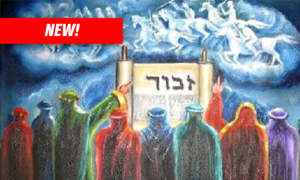Likkutei Sichos, vol. 1, pg. 213,
And Sicha, Shabbos Parshas Ki Tisa 5731
A. The Golden Age of the Jews in Persia
Before the miracle of Purim, the Jews experienced their best period in exile—Mordechai held a royal position, and a Jewish woman was queen, an exceptional occurrence in Jewish history. The Rebbe Rayatz notes that the Jews contributed to Achashverosh’s victory in a great war and were rewarded with high-ranking positions and privileges (Source 1).
Yet, precisely at this time, they faced a decree of total annihilation—the most severe threat in Jewish history (Source 2). Unlike other times in history, where a decree against Jews in one place did not affect those elsewhere, in this case, Achashverosh ruled over the entire world, leaving them no place to escape.
B. Beyond Nature
How could such a harsh decree arise precisely at the peak of Jewish security? The Talmud explains that it was because the Jews enjoyed Achashverosh’s feast (Source 3). This shows that the fate of the Jewish people is not bound to natural circumstances. Even though their political status was excellent, their participation in the feast led to the decree against them.
The annulment of the decree also occurred in a supernatural manner. Esther and Mordechai first took spiritual steps: Esther requested that all Jews fast for three days (even though one of the days was Pesach) (Source 4). Mordechai gathered 22,000 children, dressed them in sackcloth and ashes, and led them in prayer to annul the decree (Source 5). In fact, all the Jews strengthened themselves with a spirit of self-sacrifice for Torah and mitzvot (Source 6). Only afterward did Esther prepare to approach the king.
Another important detail: Esther herself fasted, even though this could have diminished her charm in the king’s eyes. Why? Because she understood that the decree was not caused by natural reasons, and therefore, salvation depended on a spiritual cause. Fasting and repentance would bring about their rescue, while her approach to the king was merely the natural vehicle through which the salvation would manifest.
C. Diplomacy is Secondary
The message for our times: Some believe that securing the survival of the Jewish people in exile depends on political and diplomatic efforts. However, the Purim story teaches that the fate of the Jewish people transcends natural laws and depends on their commitment to Torah and mitzvot. In times of trouble, we must first engage in spiritual introspection, and then natural efforts will serve as a vessel for the miracle.
D. Gather Everyone
Esther asked Mordechai to gather all the Jews of Shushan to fast for three days (Source 7). The Rebbe explains that she emphasized including even those who had participated in Achashverosh’s feast.
Mordechai initially thought it was sufficient for them to commit to eating in a holy manner from then on, but they were not worthy of joining the fast and prayers to annul the decree. On a deeper level, since they were the cause of the decree, they could not be the ones to annul it, based on the principle “A prosecutor cannot become a defender” (Source 8).
However, Esther insisted that Mordechai gather everyone, including those who had attended the royal feast. It was precisely this unity that led to the decree’s annulment. Mordechai accepted Esther’s view (Source 9), gathered all the Jews, and indeed, the decree was nullified.






